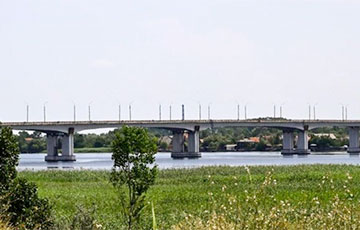AFU Attack Near Antonivsky Bridge Upsets Russian Propagandists
2- 3.07.2023, 13:55
- 23,206

"Military correspondents" decided not to repeat the official version of the Russian Ministry of Defense.
The operations of the Ukrainian Armed Forces around the Antonivsky bridge have provoked a notable wave of events in the Russian information space, and ISW analysts have drawn several conclusions on the matter.
The Russian Ministry of Defence is trying to consolidate control over the Russian information space by undermining the efforts of those "war correspondents" who have not repeated the official propaganda version regarding the events around the bridge. On the 1st and 2nd, the Russian Ministry of Defence claimed that Russian troops allegedly "successfully repulsed" an attempted Ukrainian landing on the left bank of Kherson region near the Antonivsky bridge and disproportionately celebrated this "victory" over the minor assault by the Ukrainian Armed Forces. However, some Russian "war correspondents", contrary to reports from the Ministry of Defence, noted that the fighting was still going on and that Ukrainian forces were holding some positions near the Antonivsky bridge as of July 2. At the time, Russian Telegram channels started to publish posts criticising several pro-Kremlin and pro-Warner public pages whose messages contradicted the official narrative of the Russian Ministry of Defence. Such "war correspondents" were accused of disseminating allegedly "false information" about the situation around the Antonivsky bridge and of assisting Ukrainian "psychological operations". In their turn, those Telegram channels which reported on the continuation of fighting near the bridge accused the Russian General Staff of launching an attack on the Russian "war correspondents" community. They reminded that in 2022, the Russian General Staff and the Ministry of Defence had already tried to initiate criminal proceedings against "war correspondents" and said that more accurate coverage of frontline realities significantly undermined the Russian Ministry of Defence's attempts to exaggerate Russia's successes. Some of these "rebel war correspondents" have previously interacted directly with Vladimir Putin, ISW reminds us, so it is likely that the Russian Defense Ministry is seeking to censor some Kremlin-affiliated "war correspondents" because of fears that these ultra-nationalists might reveal Russian military failures to Putin during monthly meetings of so-called "working groups on SMO issues" in the Kremlin.
The Russian defence ministry's conflict with the "war correspondents" community over a trivial military operation at the Antonivsky bridge may indicate that the Russian military command sees no other "successes" to report to Putin amid the Ukrainian counter-offensive. ISW has previously suggested that the Russian Defence Ministry may have exaggerated its "victory" in the eastern Kherson region in order to restore the reputation of the Russian Dnepr Group of Forces and the Southern Military District, whose headquarters in Rostov-on-Don was surrounded and seized by the Wagner PMC a week ago. The Russian Defence Ministry has consistently exaggerated Ukrainian losses since the start of the full-scale invasion and is perhaps not sure that such repeated [false] narratives sufficiently compensate for the absence of any Russian progress on the battlefield, since the AFU continues "limited but steady advances in eastern and southern Ukraine", ISW reminded.
The Russian Defence Ministry's attempt to exaggerate Russia's claimed tactical "victory" at the Antonivsky Bridge and its attempts to limit alternative information had the opposite effect. Russian "war correspondents" started accusing the Russian military command of not providing Russian servicemen on the eastern bank of Kherson region with boats and other supplies, and in general accused the Russian Ministry of Defence of lying about the situation on the front line for its own selfish reasons. Thus, the Russian pro-war community continues to criticise the Russian Ministry of Defence even after the failed Wagner PMC insurgency and even when Prigozhin has virtually lost its [propaganda] platform in Russia.










